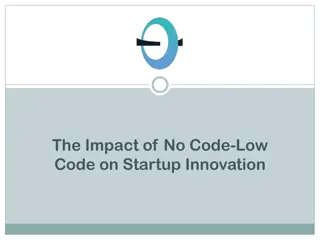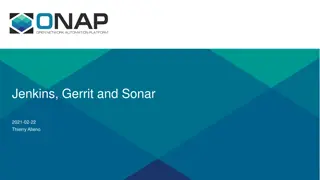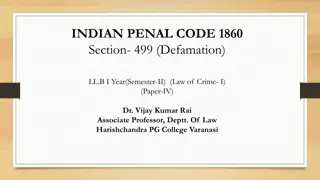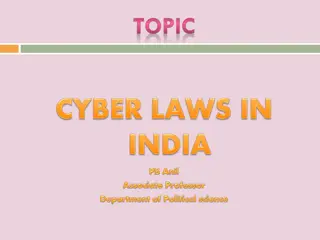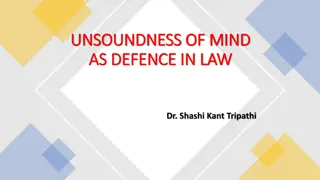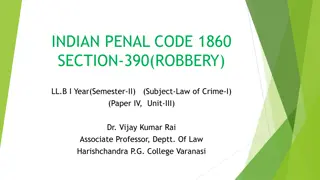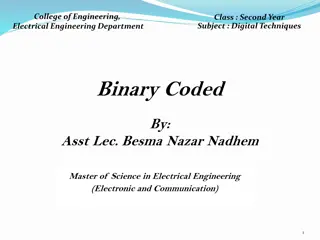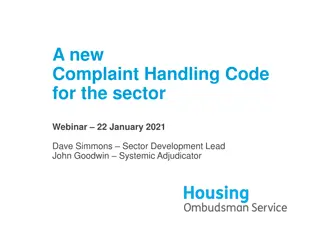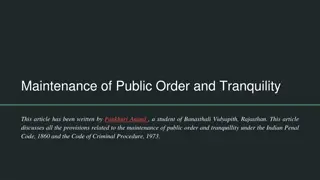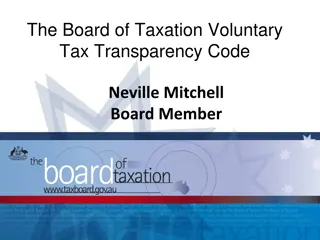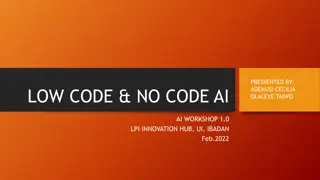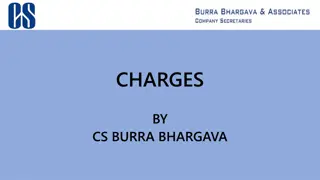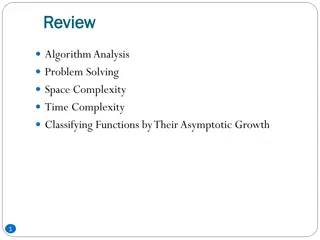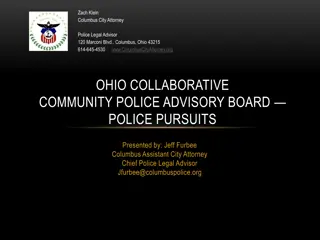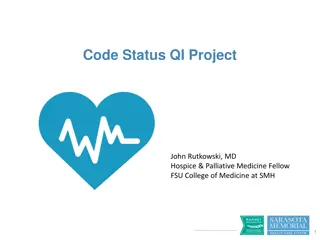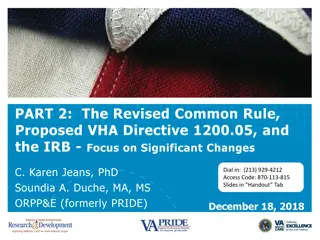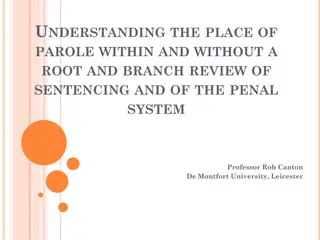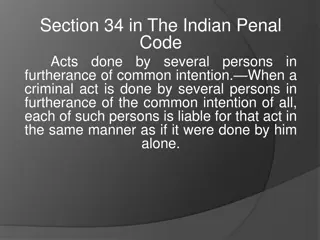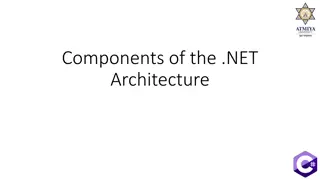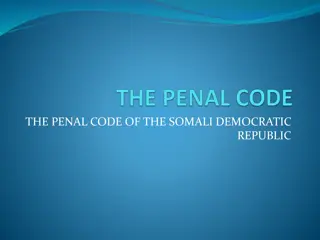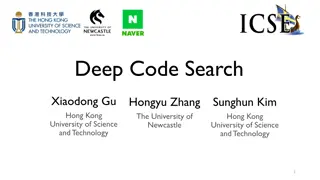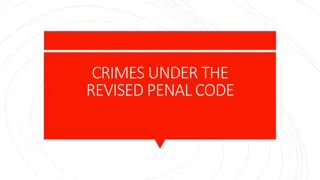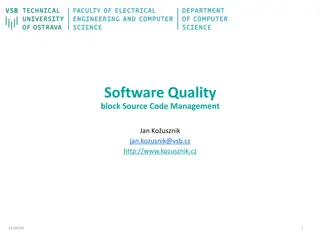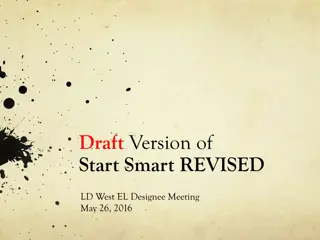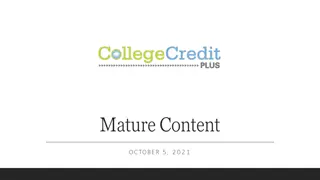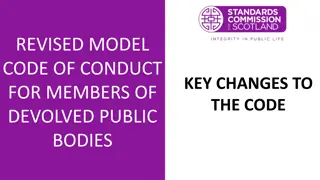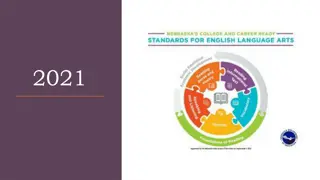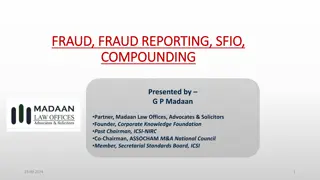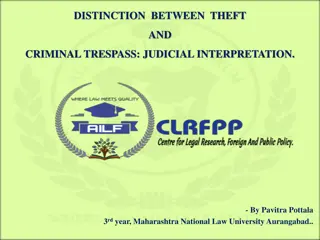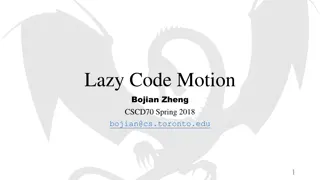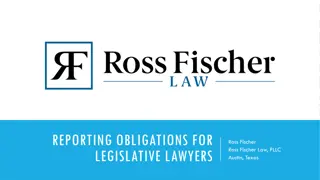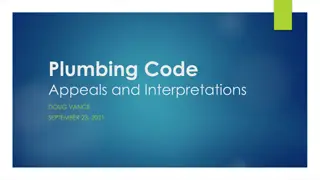The Impact of No Code-Low Code on Startup Innovation
In the vibrant world of startups, innovation is the cornerstone of success. As these businesses aim to carve out their niches, they often face a common hurdle: the extensive resources required for traditional software development. However, the emergence of low code no code (LCNC) platforms is revolu
2 views • 12 slides
Revised Approach for Distributed Energy Resource Aggregations in Wholesale Markets
Revised market design approach to comply with Order No. 2222 requires ISOs/RTOs to allow distributed energy resources to provide wholesale services. The focus is on areas like Energy and Ancillary Services Markets Participation, Metering and Telemetry Requirements, DERA Registration Coordination, an
0 views • 103 slides
Improving Code Analysis Workflow with Jenkins, Sonar, and Gerrit
Enhance code analysis processes by analyzing source code before merging, enabling analysis in branches, and triggering Jenkins jobs. Sonar.cloud provides options to analyze branches using Maven build, while the proposal suggests using Jenkins plugin for code review. Addressing challenges with Gerrit
1 views • 12 slides
Understanding Free Consent and its Components in Indian Contract Law
Free consent in Indian contract law refers to consent that is not influenced by coercion, undue influence, fraud, misrepresentation, or mistake. Coercion involves committing or threatening to commit acts forbidden by the Indian Penal Code to force someone into an agreement. Undue influence occurs wh
1 views • 13 slides
Understanding Defamation Laws in Indian Penal Code 1860 Section 499
Indian Penal Code Section 499 defines defamation as making or publishing any imputation concerning a person intending harm or knowing it will harm their reputation. The section includes explanations regarding imputations towards deceased individuals, companies, and ironic expressions. To constitute
0 views • 10 slides
Understanding Cyber Laws in India
Cyber law in India encompasses the regulations governing cyber crimes, including theft, fraud, defamation, and more under the Indian Penal Code. The Information Technology Act of 2000 addresses modern crimes like cyber terrorism and credit card frauds. The necessity for cyber laws in India arises fr
0 views • 13 slides
Development of Indian Penal Code (IPC) 1860 and Its Impact in British India
The Indian Penal Code (IPC) of 1860 was introduced in British India after a series of historical events led to the need for a comprehensive criminal justice system. The disintegration of the Mughal Empire paved the way for British takeover, resulting in variations in criminal laws across different B
1 views • 24 slides
Understanding Unsoundness of Mind as a Defense in Law
The concept of unsoundness of mind as a defense in law is explored through principles of criminal liability and historical legal perspectives. The defense under Section 84 of the Indian Penal Code provides immunity for acts committed by individuals incapable of understanding the nature of their acti
1 views • 20 slides
Understanding Section 390 of the Indian Penal Code on Robbery
Section 390 of the Indian Penal Code discusses the concept of robbery and its elements of theft and extortion. It outlines that robbery involves imminent danger or the use of violence, and the offender voluntarily causes harm or induces fear to commit the crime. The section also provides explanation
0 views • 7 slides
Understanding Binary Coded Decimal (BCD) and Excess-3 Code
Binary Coded Decimal (BCD) is a binary code used to represent decimal numbers, with the popular 8421 BCD code and its conversion process explained. Additionally, Excess-3 Code, another BCD code, is detailed with an example of finding its code for a given decimal number. Different BCD codes like 4221
0 views • 11 slides
A New Complaint Handling Code for the Sector - Webinar Highlights
This webinar discusses the introduction of a new Complaint Handling Code for the sector, aiming to address issues in social housing complaint processes. It covers key points, the background leading to the code's development, the Ombudsman's experience, and the code's aims and framework towards high-
0 views • 14 slides
Understanding Provisions for Public Order Maintenance in Indian Law
This article by Pankhuri Anand explores provisions in the Indian Penal Code and Code of Criminal Procedure for maintaining public order and tranquility. It discusses unlawful assembly, public nuisance, disputes, and their legal implications. Various sections and definitions are outlined to ensure pe
1 views • 19 slides
The Board of Taxation Voluntary Tax Transparency Code Overview
The Board of Taxation developed a voluntary Tax Transparency Code to address community concerns and promote greater tax transparency among large businesses. The Code outlines recommended disclosures for both large and medium businesses, encouraging adoption of higher disclosure standards. Internatio
0 views • 20 slides
Simplifying AI Development with Low-Code and No-Code Platforms
Explore the world of low-code and no-code AI development platforms, empowering experts to create applications with ease. Learn about the benefits, tools, and components of these innovative platforms, and discover popular AI tools for no-code development. Accelerate your digital transformation journe
0 views • 11 slides
Understanding Charges and Registration according to Companies Act, 2013
This comprehensive content covers the concepts of charges, registration of charges, fee structures, and penal provisions as per the Companies Act, 2013. It explains the duty of companies, fee structures for charges created before and after specific dates, and the importance of timely registration to
0 views • 12 slides
Understanding Pseudo Code and Flow Charts for Algorithm Analysis
Explore the concepts of pseudo code and flow charts for analyzing algorithms, problem-solving, and understanding space and time complexity. Learn about basic elements of pseudo code, assigning operations, and writing effective pseudo code statements in a clear and structured manner. Discover the imp
0 views • 26 slides
Ohio Revised Code Sections on Emergency Vehicle Regulations
Explore the Ohio Revised Code sections pertaining to emergency vehicles, covering exemptions for emergency vehicle drivers in response to emergency calls, procedures for proceeding past red signals, and speed limit exceptions. These regulations ensure that emergency vehicles can navigate safely whil
0 views • 21 slides
Enhancing Code Status Discussions in End-of-Life Care: A Quality Improvement Project
This project led by Dr. John Rutkowski aims to reduce inappropriate interventions for patients with DNR or Modified Code Status by implementing an improved code status documentation system. Data analysis reveals a need for better documentation practices, and survey responses highlight various challe
0 views • 18 slides
Revised Common Rule and Proposed VHA Directive 1200.05 Update
Update on the significant changes in the Revised Common Rule and Proposed VHA Directive 1200.05, focusing on the impact on the IRB, membership, functions, and review of research. Details provided on the status of the Revised Common Rule, VHA Handbook 1200.05, and applicability of pre-2018 and 2018 r
0 views • 38 slides
Understanding the Place of Parole: A Review of Sentencing and the Penal System
Exploring the role of parole within the context of sentencing and the penal system, this review delves into themes of justice, risk assessment, rehabilitation programs, victim involvement, offender perspectives, public perceptions, and challenges faced by community supervisors. The discussion touche
1 views • 9 slides
Jordan Penal Code Overview: Punishments for Various Offenses
Jordan's penal code details punishments for different offenses such as murder, assault, intentional harm, negligence causing death, defamation, and document tampering. Penalties include imprisonment with hard labor ranging from five years to fifteen years, and fines up to JD50. Specific articles out
0 views • 8 slides
Understanding Fraud and Forensic Accounting
Fraud is defined as deception to gain an unlawful advantage. Various legal definitions of fraud under Indian law are discussed, including those under the Indian Penal Code, Indian Contract Act, and Companies Act. The concept of forensic accounting in detecting and investigating fraud is also introdu
0 views • 15 slides
Understanding Section 34 in the Indian Penal Code
Section 34 of the Indian Penal Code deals with acts done by several persons in furtherance of a common intention. Common intention involves a prior agreement among offenders to commit an offense, requiring active involvement of all. Key points include pre-arranged planning, participation of two or m
0 views • 10 slides
Understanding the .NET Architecture Components
The .NET architecture comprises various key components such as the Common Language Specification, Code Manager, Managed Code, Unmanaged Code, and Native Code. These components play crucial roles in the development and execution of applications within the .NET framework. Managed code is executed by t
0 views • 21 slides
The Penal Code of the Somali Democratic Republic
The Penal Code of the Somali Democratic Republic comprises three main sections focused on offenses in general, crimes, and contraventions. It specifies that individuals can only be punished for acts explicitly deemed offenses by law and outlines principles governing punishments, jurisdiction, elemen
0 views • 23 slides
Challenges in Code Search: Understanding, Matching, and Retrieval
Programming can be challenging due to the lack of experience and unfamiliar libraries. Code search engines struggle with representing complex tasks, while information retrieval techniques aim to bridge the gap between source code and natural language queries. The mismatch between high-level intent a
0 views • 21 slides
Understanding Direct Bribery and Public Official Offenses
Bribery of public officials under the Revised Penal Code, specifically Articles 210 to 212, involves direct, indirect, and qualified bribery. Direct bribery encompasses acts where a public officer agrees to perform or abstain from acts in exchange for gifts, promises, or considerations. Offenses inv
0 views • 35 slides
Software Quality and Source Code Management Best Practices
Effective source code management is crucial for software quality assurance. This involves locking down code, baselining milestones, managing code variants, and ensuring traceability. Software Configuration Management (SCM) is key, encompassing configuration items and core concepts like creating base
0 views • 34 slides
Start Smart Revised: Constructive Conversation Skills Workshop
Dive into the revised version of Start Smart to enhance students' Constructive Conversation skills through collaborative activities and discussions. Explore the differences between the original and revised lessons, share valuable insights, and provide feedback for continuous improvement.
1 views • 9 slides
Understanding Ohio Revised Code Chapter 3365: Managing Mature Subject Matter in Education
Ohio Revised Code Chapter 3365 introduces regulations regarding mature subject matter in education, requiring specific actions from colleges and secondary schools. It defines mature subject matter and outlines procedures for handling such content, including the development of permission slips and st
0 views • 21 slides
Key Changes in Revised Model Code of Conduct for Members of Devolved Public Bodies
Key changes in the revised model code of conduct for members of devolved public bodies include modifications in general conduct, registration of interests, lobbying, and access. The updated code emphasizes personal responsibility, respect, and courtesy while prohibiting bullying, harassment, and dis
0 views • 19 slides
Implementing Revised Standards: A Guide for Transition and Alignment
Explore the transition from legacy to revised standards in the education sector, focusing on communication, instructional materials, professional learning, and assessment. Discover the stages of implementation and categories of work involved. Prepare for the 2021-22 academic year by assessing readin
0 views • 7 slides
Multi-Label Code Smell Detection with Hybrid Model based on Deep Learning
Code smells indicate code quality problems and the need for refactoring. This paper introduces a hybrid model for multi-label code smell detection using deep learning, achieving better results on Java projects from Github. The model extracts multi-level code representation and applies deep learning
0 views • 10 slides
Understanding Fraud: Definition, Laws, and Implications in India
A comprehensive overview of fraud in India covering its definition, relevant laws from the Indian Contract Act and Indian Penal Code, and the serious implications it carries. Explore the elements that constitute fraud and the legal consequences associated with fraudulent activities.
0 views • 47 slides
Understanding the Distinction Between Theft and Criminal Trespass
Exploring the nuances between theft and criminal trespass under the Indian Penal Code 1860, this study delves into the essential ingredients, punishments, and kinds of offenses associated with each. It emphasizes the importance of judicial interpretation in distinguishing these two crimes, providing
0 views • 10 slides
Overview of CAIN Particle Tracking Code for High-Energy Colliders
CAIN is a particle tracking code used for high-energy collider simulations since 1984. Initially named ABEL, it evolved to include beam-laser interactions for gamma-gamma colliders. The code, written in FORTRAN 90, handles beam-beam and external fields, with a structure where all particles are store
0 views • 17 slides
Lazy Code Motion and Partial Redundancy Elimination in Optimizing Compiler
Lazy code motion, partial redundancy elimination, common subexpression elimination, and loop invariant code motion are optimization techniques used in compilers to improve code efficiency by eliminating redundant computations and moving code blocks to optimize performance. These techniques aim to de
0 views • 35 slides
Unleash the Power of JavaScript Slot Machine Code for Your Online Casino (1)
Learn how to create captivating online slot machines with JavaScript Slot Machine Code, Casino game code, Casino game HTML code, HTML5 casino games source code, Slot machine JavaScript for your platform.\n\nKnow more>>\/\/ \/javascript-slot-machine-c
0 views • 4 slides
Understanding Reporting Obligations for Legislative Lawyers
Explore reporting obligations for legislative lawyers including registration triggers, communication guidelines, subject matter influencing legislation, and ethics to advocate in non-adjudicatory proceedings. Discover key differences and requirements under lobby law, PFS law, and the Penal Code.
0 views • 23 slides
Plumbing Code Appeals and Interpretations Overview
This document provides information on the agenda, upcoming professional development events, Building Code Appeal Board, Appeal Board decisions, Code Interpretation Committee, code interpretations, and final thoughts related to plumbing code appeals and interpretations. It covers the appeal process,
0 views • 8 slides
